Following Tucker Carlson's report from the Moscow metro, Network X users has compiled a list of the 10 most beautiful metro stations in the world and I was curious to take a closer look at the list. .
While compiling the post, I was surprised to find that I had been to some of the stations on the list, but in the hustle and bustle of everyday life I never thought about the architectural grandeur and engineering genius of the minds that built them. I was also interested to know the history of creation of these objects. I hope you will enjoy this journey with me...
Let's take a Hive tour together to the top of the most beautiful stations according to the X network users:
1 - Mayakovskaya, Moscow.
Opened September 11, 1938 in honor of poet Vladimir Mayakovsky
In 1939 the station's design won the Grand Prix at the World Exhibition in New York. The station has the status of a valuable object of cultural heritage of regional significance.

At the plant "Dirijablestroy" in Dolgoprudny, stainless steel bands were made for the station decoration. The niches of the vault of the central hall were decorated with mosaic panels made according to the sketches of artist A. A. Deineka

During the World War II the station was used as a bomb shelter. On November 6, 1941 a meeting of the Moscow Council of Workers' Deputies with Moscow party and public organizations was held at Mayakovskaya on the occasion of the 24th anniversary of the October Revolution of 1917. On that day Joseph Stalin made a speech here, and he arrived at "Mayakovskaya" by train from the direction of the station "Belorusskaya"

On the night of July 17-18, 2017, the station screened the first episode of the seventh season of the TV series Game of Thrones. Since 2021, off-site marriage ceremonies have been held on the station's platform. Registrations are held at night so as not to disturb passengers

The drawbacks of the station design include the fact that the mosaic panels are actually excluded from the general architectural ensemble. To view them, one has to stand under one of the domes and lift one's head up. Critics also noted the absence of Vladimir Mayakovsky's theme in the initial design of the station[1]; the bust of the poet appeared there only after the war.
2 - Komsomolskaya, Moscow.
Columnar three-vaulted deep-base station with one island platform opened on January 30, 1952 as part of the "Kurskaya - Belorusskaya" section It is one of the busiest metro stations in Moscow (mainly due to the 3 railway stations located nearby). According to 2014 data, the average passenger traffic at the station amounted to 163 thousand people per day!

Originally it was planned to build three concourses of Komsomolskaya, but only one was built. The transition to the Sokolnicheskaya line opened together with the station.

The lobby combines the top of the escalator tunnels of the two stations, the entrance from Komsomolskaya Square, the exit to the square between Yaroslavsky and Leningradsky stations and the entrance from the underground lobby with corridors from both of these stations

The station structure is a columned three-vaulted deep-laying station.Prefabricated cast-iron lining is used in the construction, monolithic slab is used as a trough. The length of the boarding hall is 190 meters, the width of the central aisle is 11 m (instead of 8 m typical for stations of this design), the height of the hall is 9 m (instead of 5.5 m)
Architecturally, the Komsomolskaya station is an apotheosis of the Stalin Empire, characterized by grandiosity, pomp, combination of elements of classicism, Empire and Moscow Baroque. The station was conceived as one of the busiest transportation hubs of the city and as a kind of Moscow gateway
3 - City Hall Station, New York.
The Neo-Romanesque style station opened on October 27, 1904 as part of the first phase of the Interborough Rapid Transit Company (IRT) network. Because of its structure, this station is also called the City Hall loop.

The station has been closed since December 31, 1945.
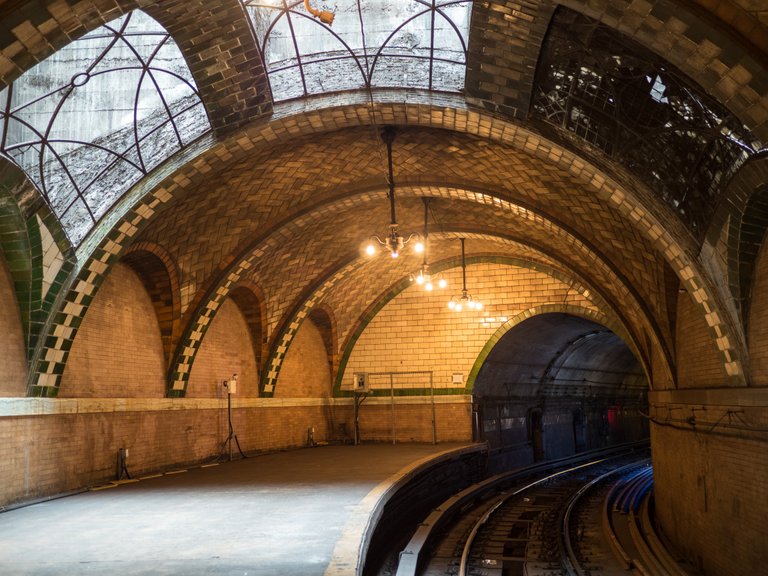
Thanks to the preserved retro design, this station has been used many times for filming movies. For example, it can be seen in such movies as "Mutants" and "Fantastic Beasts and Where They Dwell".

The City Hall station on the IRT local track was lavished with fine architectural details, including glass tiles and large chandeliers. However, the Guastavino vaulted ceilings and skylights were lost on busy commuters, and the stop was one of the least-used in the system.

Glass blocks in the ceiling of the station and the Emergency Exit in the park by the Town Hall in the background
4 - Baker Street, London.
A London Underground station located under the junction of Baker Street and Marylebone Road. Trains on five different subway lines stop at the station
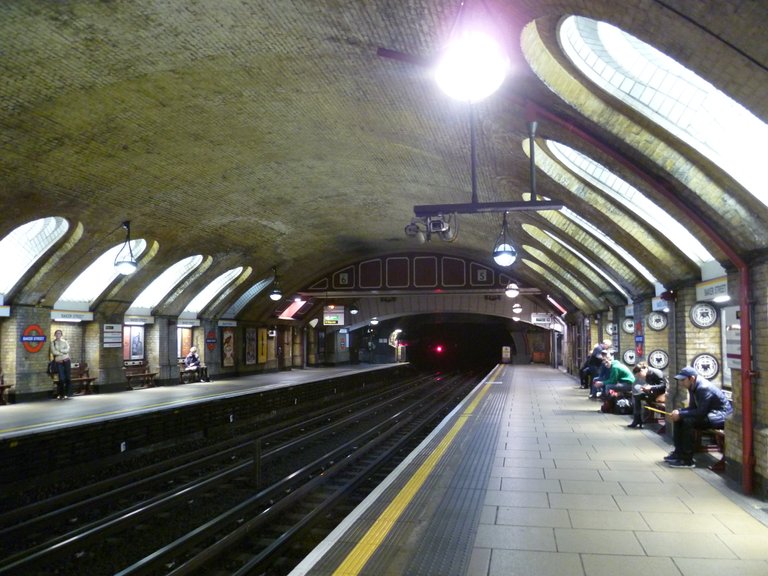
Opened as part of the Metropolitan Railway (MR) line on January 10, 1863 as part of the world's first subway line - today these platforms are served by trains of the Hammersmith & City and Circle lines. On April 13, 1868, the surface platforms, now served by Metropolitan Railway line trains, were opened to serve trains on the line to Suisse Cottage station
Over the next few decades the station was rebuilt to consist of 4 platforms. The existing platforms for Metropolitan line trains date from 1925 and were built by architect Charles Clarke, as was a complex of buildings nearby.
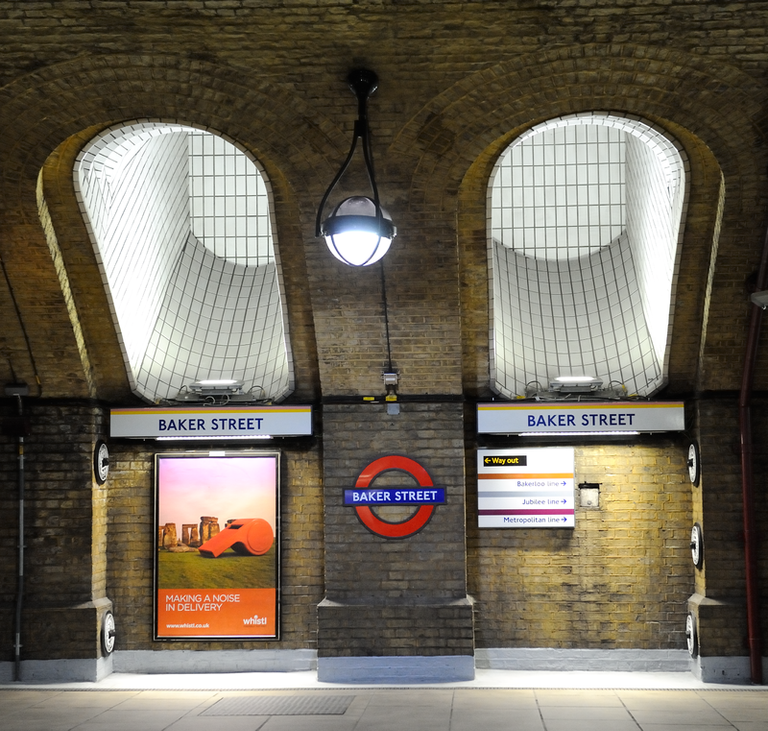
The station complex itself is quite voluminous. The shallow station is connected to the above-ground platform for the Metropolitan line trains.
Underneath the shallow station is another station for trains on the Bakerloo and Jubilee lines. To improve passenger service between the two lines, a cross-platform transfer is organized.
Today, with its 10 platforms, the Baker Street station complex is the largest station on the London Underground.

There is a monument to Sherlock Holmes at the Marylebone Road exit of the station in memory of the famous Baker Street detective.

5 - Toledo, Naples.
Toledo is one of the most beautiful stations in the Naples Metro. Situated as if under the vaults of heaven, it resembles an art pavilion. The mosaics, intricately illuminated in blue and silver hues, create an optical illusion, and the escalator seems like a tunnel leading directly under the clouds.

Such an unusual way of organizing the underground space was invented by Spanish architect Oscar Tusquets Blanca. Together with South African lighting artist William Kentridge, he developed a unique lighting system. Thanks to it, the passengers of the station feel like they are either under a sky shimmering with bright stars or directly on the ocean floor, swarming with luminous jellyfish. Toledo opened in September 2012. It is one of the deepest subway stations in the world. It features 18 escalators. Two of them descend to a depth of 30 meters - the height of an eleven-storey building.

The architectural design embodied in the tunnels of the Toledo metro station is part of a large-scale urban plan for Naples. Over the past few years, the world's leading designers, artists and architects have been transforming the city's metro stations into underground works of art.
With the construction and expansion of numerous metro lines the municipality of Naples developed the project Stations of Art (also known as Hundred Stations Plan), with which it was intended to entrust the planning of metro stops to well-known contemporary artists and architects. Then, with a resolution (resolution of 19 May 2006 Number 637), the Campania region issued guidelines to be applied to the design and construction of a station.

The Art Stations, distributed along the lines 1 and 6 of the Metro network, include more than 180 pieces of art created by 90 international authors and by some young local architects, allowing them to combine different architectural styles. On November 30, 2012, the Toledo station was elected as the most beautiful of Europe by The Daily Telegraph
img. Mario Esposito shot__seeker
Wiki
6 - Elektrozavodskaya, Moscow.
Pylon three-vault deep-wall station with one island platform. It is a monument of cultural heritage of Russia. It is connected with the station of the same name on the Great Ring Line.

The design of Elektrozavodskaya in 1939 was commissioned to architects V. A. Shchuko and V. G. Gelfreich, who involved their student I. V. Rozhin in the work
After the outbreak of World War II, construction was frozen and the buildings were used as shelters

The ground lobby is made in the form of a squat hexagonal building with a massive flattened dome. In the vaulted niche of the lobby there is a sculptural group "Metrostroyers in the face" (sculptor G. I. Motovilov), depicting three tunnelers with tools.
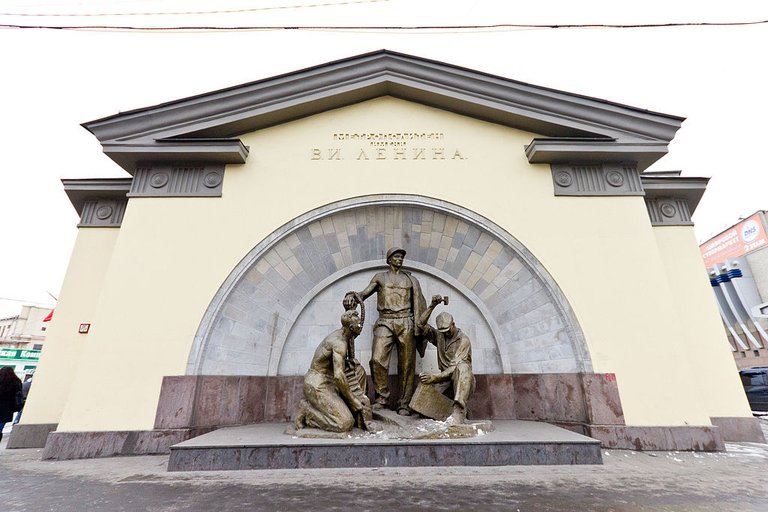
The subway lobby and sculptures of metro construction workers
On the walls of the cash and escalator halls, lined with red salieti marble, there are medallions with portraits of the founding scientists of electrical engineering: M. V. Lomonosov, P. N. Yablochkov, A. S. Popov, M. Faraday, B. Franklin, W. Gilbert.
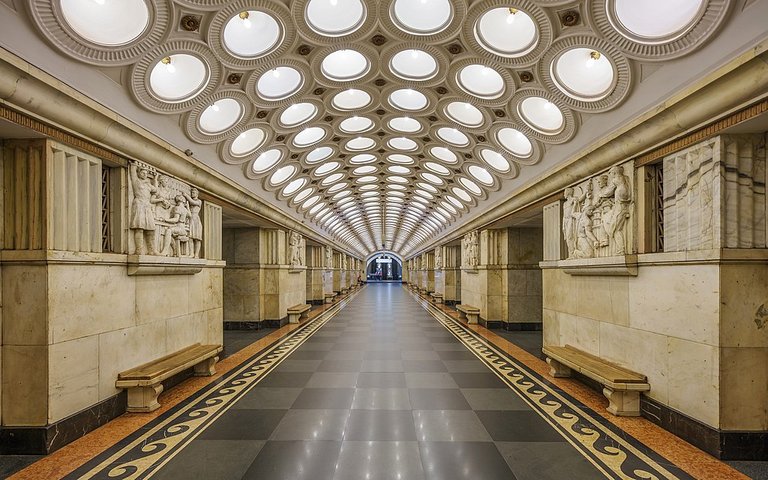
Initially, the image of the station was associated with the nearby Electrozavod. In 1943, after the resumption of work on the station, the theme of the heroic labor of the people in the fight against the Nazi forces became relevant
The bas-reliefs made of Prochora-Balanda marble on the pylons of the central hall are dedicated to the theme of labor. They depict workers of the Electrozavod, builders, blacksmiths, representatives of agriculture, etc. Now there are 12 bas-reliefs at the station; two were dismantled during the reconstruction of the central hall
7 - Arts et Métiers, Paris.
The station opened on October 19, 1904 and takes its name from the Museum of Arts and Crafts above it.

It is one of the few stations of the French Metro that is worthy of close examination.
Once on the platform, it is as if the passenger finds himself inside the copper cylinder of a steam engine on which the piston trains run. The ceiling is of copper plates, and in the portholes of the vault are exhibits of the Museum of Arts and Crafts.

Oval walls, copper plating on thick rivets, large round portholes of thick glass, strips of neon lights above the platforms and mysterious huge gears under the ceiling in the center of the hall, connected with each other by a thick shaft of crank mechanism create the impression of being inside the famous "Nautilus" of Jules Verne thanks to the Belgian artist François Schuiten.

8 - Marienplatz, Munich.
The opening of the Munich subway was timed to coincide with the 1972 Munich Olympics. More than 90% of the subway runs subway. The Munich subway operates a line and route system.
Messestadt West - Opened on May 29, 1999 as part of the Innsbrucker Ring - Messestadt Ost section. The station was planned to be called "Rim West" or "Neu-Rim West"

A single-span station of shallow construction. The naturally left track walls are painted light red. The concrete ceiling is equipped with two rows of lamps and additionally nine round glazed niches through which daylight enters the station. The platform is lined with light-colored granite slabs. It has two exits at both ends of the platform. In the eastern part of the platform there is an elevator

9 - Alisher Navoi, Tashkent.
Opened on December 8, 1984 as part of the first section of Uzbekistan line "Alisher Navoi" - "Tashkent". Located between "Gafur Gulyam" and "Uzbekskaya" stations.
It is named after Navoi Avenue, under which it is located. In turn, the avenue is named in honor of the poet Alisher Navoi.

The station is columned, three-span, shallow with two underground concourses, in the southern concourse there is a transition to the station "Pakhtakor" of Chilanzar line.
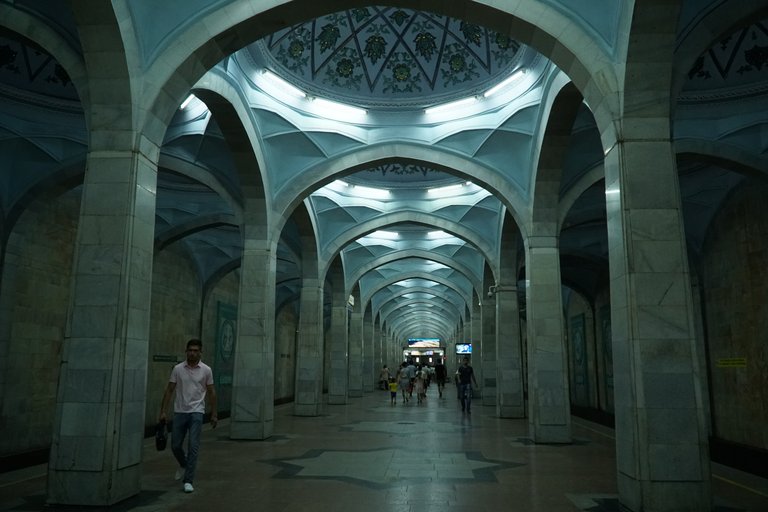
The interior of "Alisher Navoi" station is decorated with ornament of girikhs and islimiyas by artists R. Mukhamadjonov and A. Rakhimov.
The walls of the hall are decorated with panels of Navoi's "Khamsa" and bas-relief of Navoi (artists Ch. Akhmarov, I. Kayumov, plaster masters A. Aminov, U. Mamatov. Mamatboyev, sculptor A. Shaimuradov).
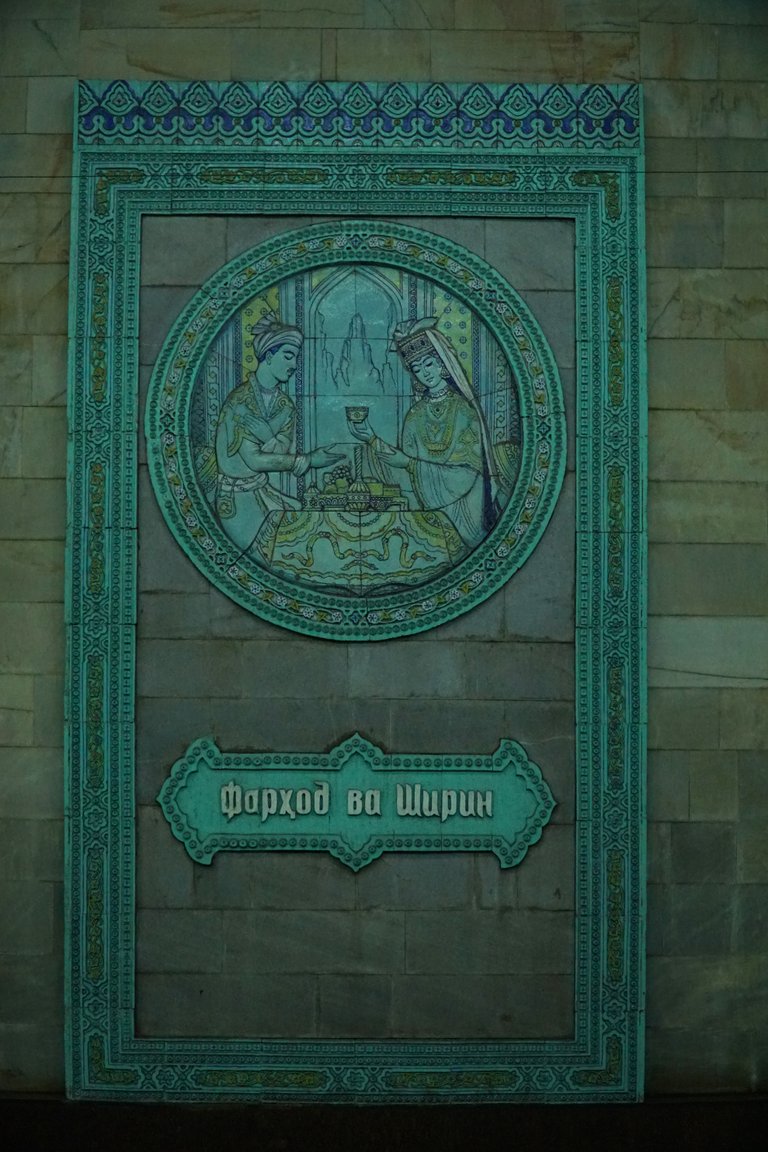
Navoi's work gave a powerful impetus to the evolution of literature in Turkic languages, especially Chagatai literature and the Uzbek tradition that adopted it.
10 - Rådhuset, Stockholm.

Opened on 31 August 1975 as part the first stretch of the Blue Line between T-Centralen and Hjulsta
The entrance on the Kungsklippan side of the street is designed in the same style as the surrounding architecture, the artists used pink granite, aluminum and neon.
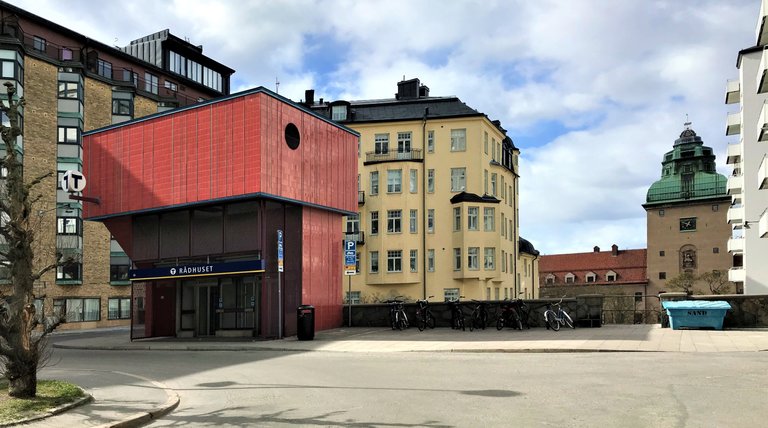
One of the exits is equipped with elevators instead of escalators
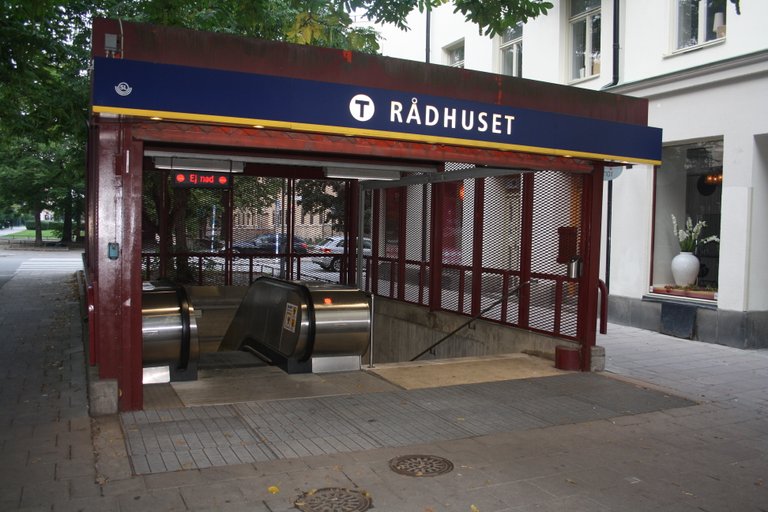
It has east and west entrances. Like many other stations on this line, it is an example of organic architecture, leaving the natural rock surface untreated, thus creating the impression of a natural underground cave system. It is decorated in pop-art style with compositions of baskets and firewood in the wall, as well as artistic elements in the form of boots hanging directly from the ceiling.

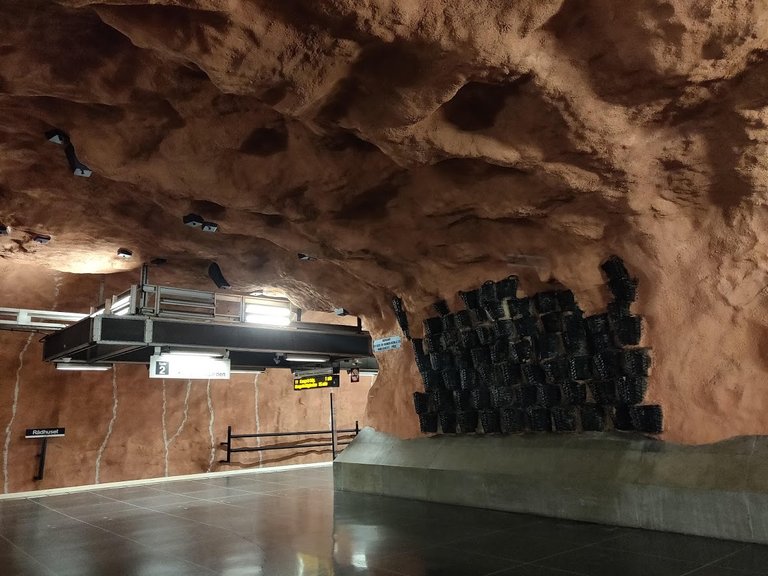
When decorating the Rådhusets station, the designers used archaeological finds unearthed from excavations while exploring Kungsholmens


In my opinion, this station should occupy the first place in the top. It may not be the deepest or most technically complex structure, but the combination of curves of natural stone with the symmetry of artificial elements and modern transportation technologies gives the visitor an indelible impression of the greatness of both nature, which has been forming these solid deposits for centuries, and man, who has managed to adapt this place for public needs with his persistence and technology
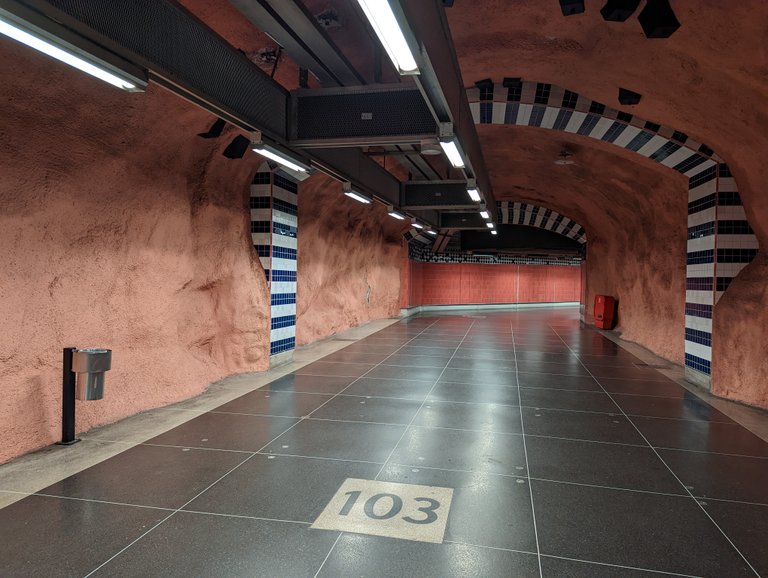
- Avtovo, St. Petersburg. (Out of rating)
The station was opened on November 15, 1955 as part of the first line of the Avtovo - Ploshchad Vosstaniya metro, and it was at Avtovo station that the first train of the Leningrad Metro arrived.
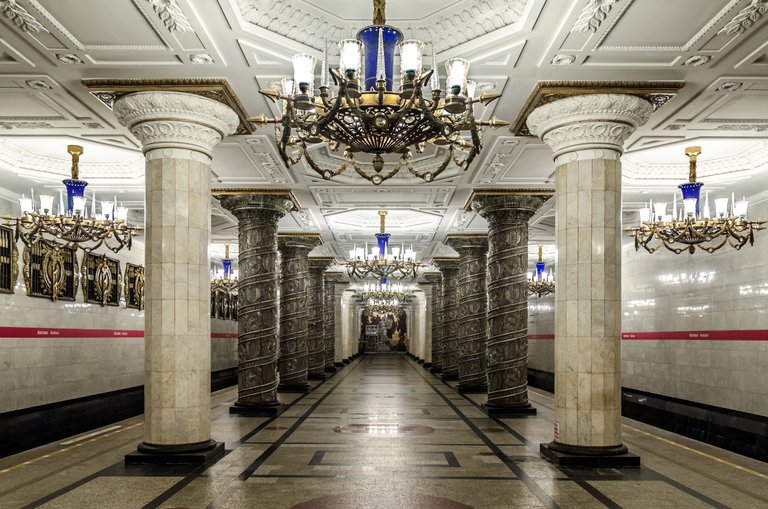
On December 15, 2011 the Council for the Preservation of Cultural Heritage included the station in the unified state register of cultural heritage objects of regional significance.
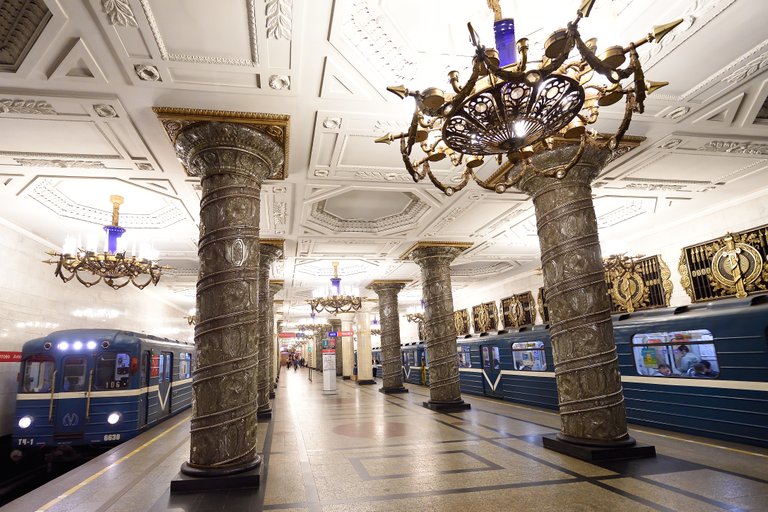
In 2014, according to the influential English publication Guardian, Avtovo station was included in the list of the 12 most beautiful stations in the world, also in 2023 the beauty of the station was appreciated by the American entrepreneur and engineer Ilon Musk
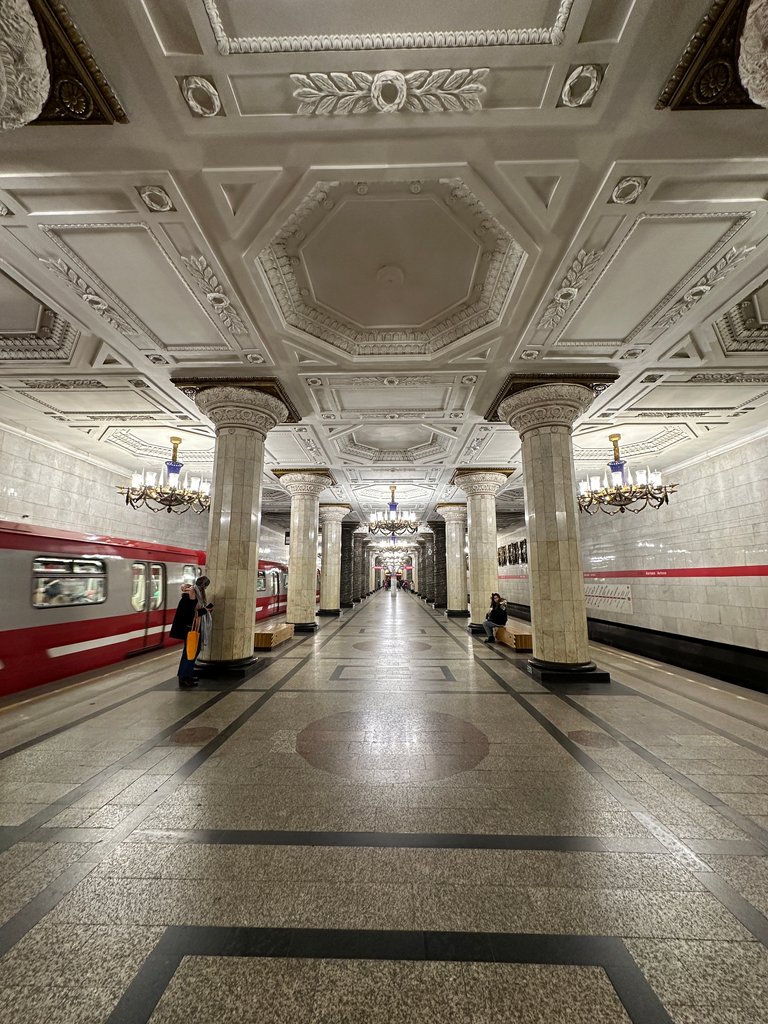
The flat ceiling of the hall is supported by 46 columns. Of them 30 are faced with marble, and 16 - with decorative plates of molded glass with reverse relief. Glass as a facing material in the subway was used for the first time.
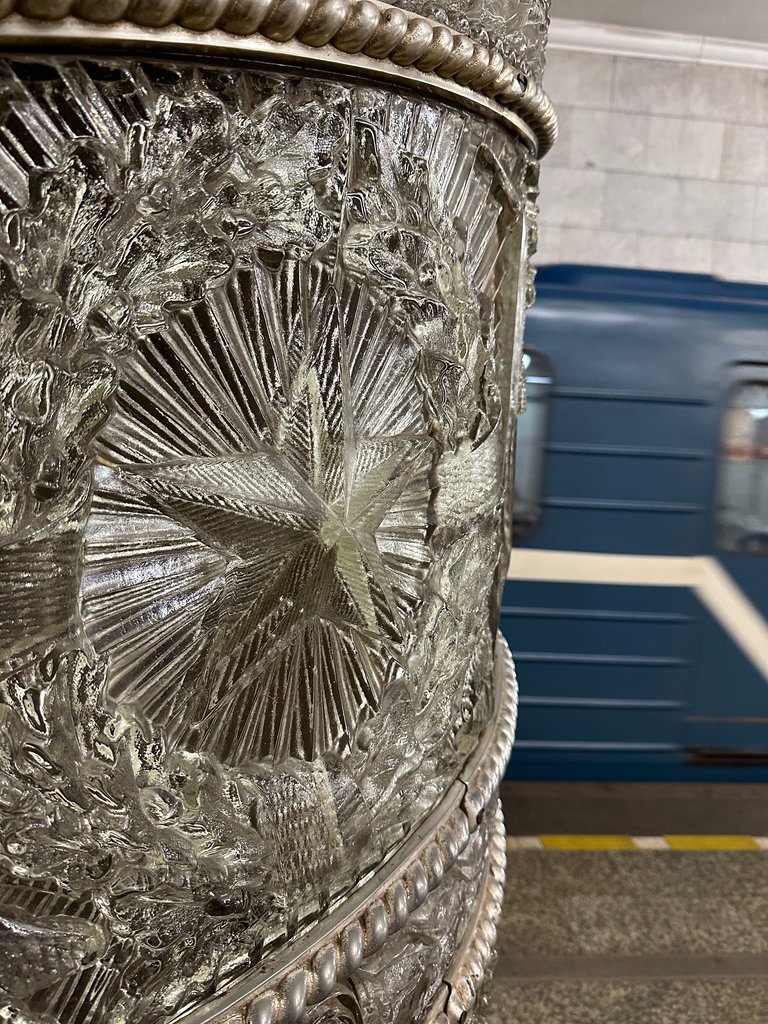
The inner surface of the glass panels has a faceted relief, with an angle of 80 degrees. This faceting creates an optical effect - when all the columns seem to be glass monoliths.
The original project provided for glazing and internal lighting of all columns of the underground hall. However, the contractor did not have time to fully fulfill the casting by the commissioning of the object, and the columns were temporarily lined with stone. But after Khrushchev's speeches against "architectural excesses", the issue of cladding the remaining columns was not returned to again
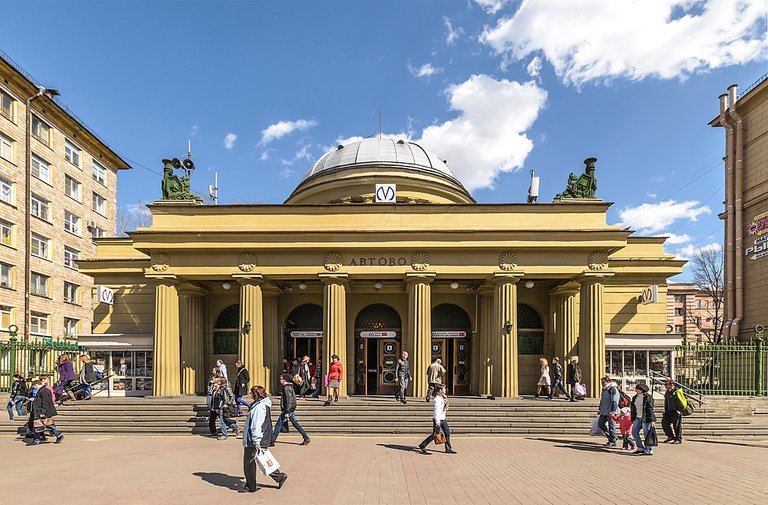
The pavilion of the station is located on Stachek Avenue. It is decorated with a powerful double six-column portico and a dome on a large light drum.
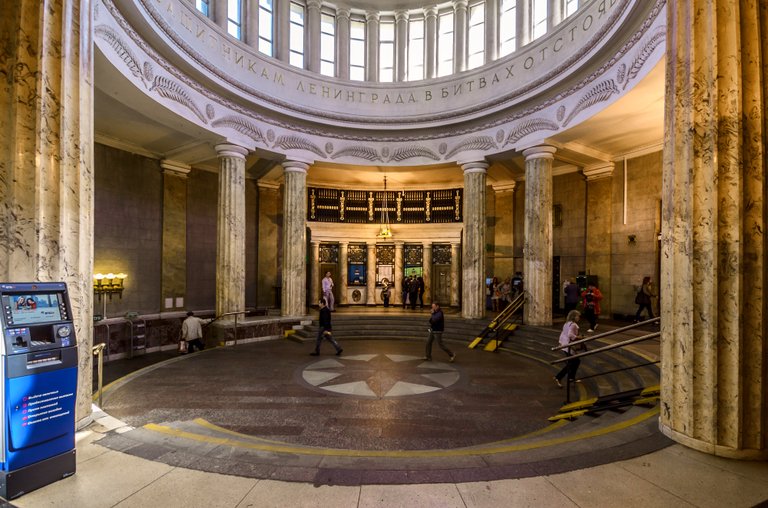
The base of the dome is surrounded by the inscription: "Glory in the ages to the valiant defenders of Leningrad, in battles defending the hero-city" (in the original version "Glory to Great Stalin").
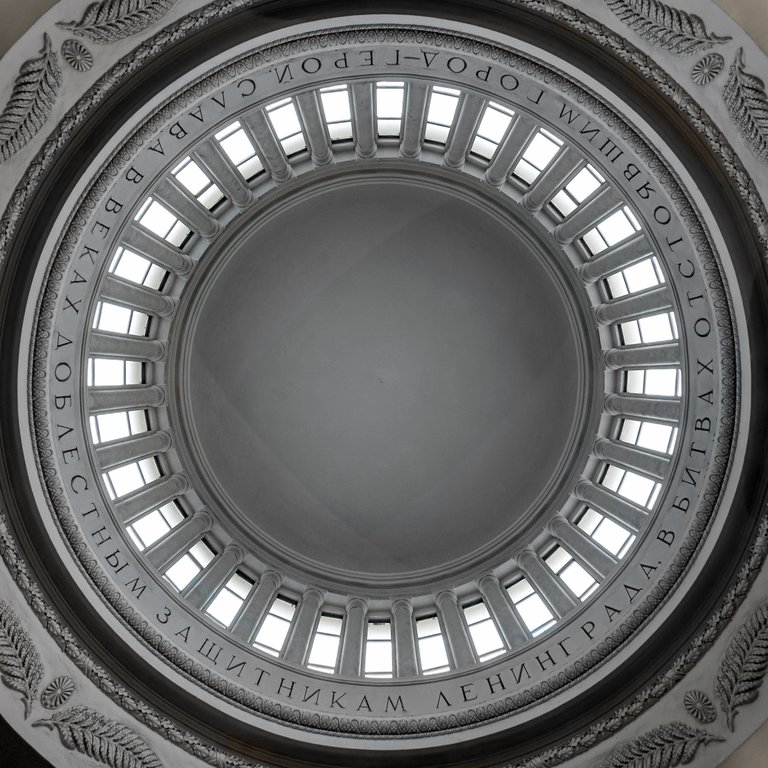
The facades of the station pavilion are decorated with panels "The Defense of Petrograd in 1919" and "The Defense of Leningrad in 1941-1943" by sculptors V. I. Ingal, V. N. Belskaya, V. I. Gordon, V. V. Chibrikov, E. V. Shcheglova and M. P. Shcheglov.
- "Avtovo" was the first metro station to retain the oikonim (name of the historical part) in its name, and of Finnish origin. Previously there was the village of "Autovo", from which the area got its name.
- "Avtovo" was the first Leningrad metro station without escalators
The tunnels connecting Avtovo station with Avtovo electric depot run under the Krasnenka River in plastic clay and loam saturated with water. Because of this, metro builders used ground freezing to dig the section to the depot. - The station is used daily by about 41.5 thousand people

Which of the stations did you like the most, which ones did you visit?
If you think a station didn't make the top, I suggest leaving its name with your impressions of it in the comments below to compile your own Hive top
all images used in the design of my post are taken from public sources Unsplash & Wikipedia

I can if I want, but sometimes I'm lazy)

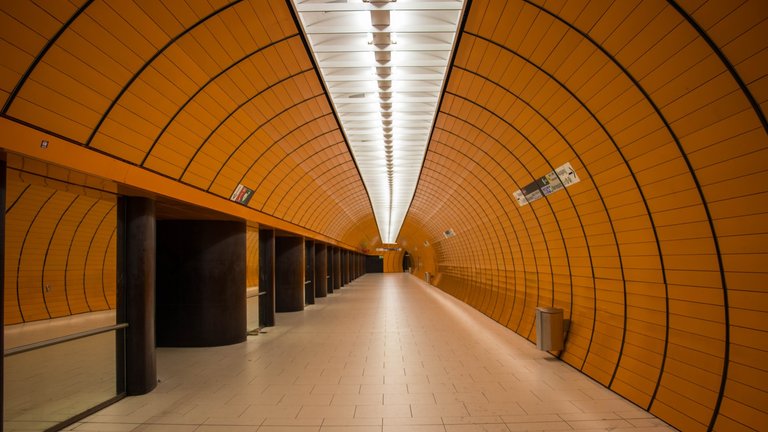
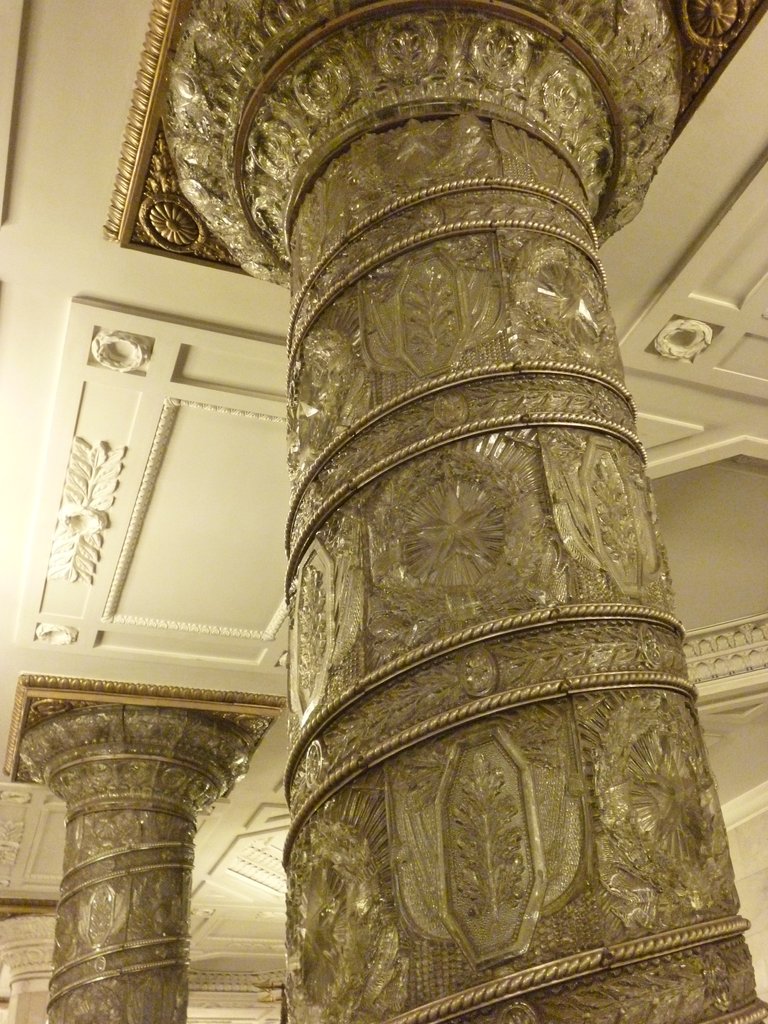



Entered your post to check if 'Avtovo' is included or not.
Well, it was! Sadly there are no own photo used in this post... afraid your post will not get any rewards this way from @pinmapple... 😱😱😱
have some Hive !BEER as consolation. 🍺 Peace! 🙏
Given my content line, this post will not get rewards from anyone.))
Thank you
Some free Hive-engine tokens for you:
!PGM !PIZZA !LOL !DHEDGE !LUV
Thank you!
!WEED
Thank you for your witness vote!
Have a !BEER on me!
To Opt-Out of my witness beer program just comment STOP below
View or trade
BEER.Hey @vp-freelance, here is a little bit of
BEERfrom @isnochys for you. Enjoy it!Learn how to earn FREE BEER each day by staking your
BEER.@atma.love!
@vp-freelance passed you the virtual joint!If you do not want to receive these comments, please reply with !STOP
The Russian ones are the best, plus Toledo and Stockholm.
A joke that US and UK are even on the list!
I think in Athens (they created a new one especially for the Olympiad 2004) there are a few very nice ones as well.
These are probably not all the stations worthy of our attention, but I've based the top on the X network
While gathering information about stations, I came across alternative tops from other sources. Now I think it would be more appropriate to add stations from other compilations not included in this one.
Thank you for your feedback!
Without a doubt my favorite was Avtovo, St. Petersburg
I agree, they knew how to build grandiose in Russia.
I am utterly impressed by the ones from Moscow and Toledo, they look like museums lol. What a beautiful mind must have had the architects that imagined these marvels of architecture!
Have you scrolled to the bottom of the post? it included one station from my city, that is of 'Avtovo' - also known as the Moria Underground Dwarfs Palace :P
Your city is a work of architectural art!
Yes, that is also a work of art! I am impressed by the beauty of the russian style
It's a pity that there are fewer and fewer objects of this scale nowadays.
Thank`s for your visit and have a good day!
The style that is now used when building subways is definetely different, I admire the creativity and artistry of the past artists!
View or trade
BEER.Hey @vp-freelance, here is a little bit of
BEERfrom @qwerrie for you. Enjoy it!Learn how to earn FREE BEER each day by staking your
BEER.!DHEDGE
This post has been selected for upvote from our token accounts by @qwerrie! Based on your tags you received upvotes from the following account(s):
- @dhedge.bonus
- @dhedge.ctp
- @dhedge.pob
- @dhedge.neoxag
- @dhedge.waiv
@qwerrie has 10 vote calls left today.
Hold 10 or more DHEDGE to unlock daily dividends. Hold 100 or more DHEDGE to unlock thread votes. Calling in our curation accounts currently has a minimum holding requirement of 100 DHEDGE. The more DHEDGE you hold, the higher upvote you can call in. Buy DHEDGE on Tribaldex or earn some daily by joining one of our many delegation pools at app.dhedge.cc.